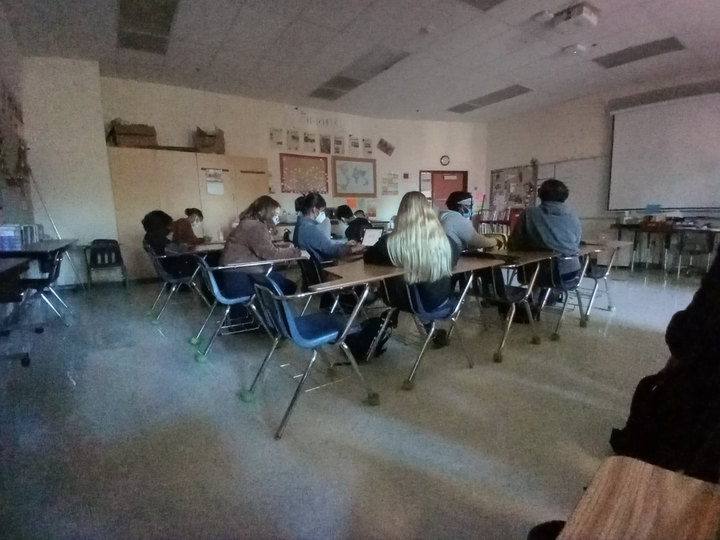Image provided by author. Top: WHS students working during a blackout.
A few weeks ago in November, students at Washington High and various other schools in the district experienced a power outage right before third period, at around 10 o’clock. Although some students outside may not have noticed, every person that was indoors or in a classroom immediately saw when all indoor light sources went out. The internet connection disappeared, and anything plugged in and not on a battery would have failed to operate. To be fair, this unprecedented school incident was not limited in scope to Washington High. A blackout this long hadn’t ever happened at Washington, and a wide swath of Fremont was also affected by the temporary loss of power.
While ultimately nothing happened, the ramifications of the school losing power are still very serious. When asked if the school had an official plan of action in case of a blackout, Principal Bob Moran admitted that Washington did not and that they had to revise their decisions as things progressed. According to Mr. Moran, the phones and speakers that ran primarily on power lines only had enough spare battery storage to operate for less than an hour, leading admin to station staff members between buildings to act as relay stations in case of emergency. According to him, though the phones were spotty, “We were able to monitor the situation, [and] adjust.” It was unknown if the fire alarms would have functioned properly, with the exit signs being the only functional evacuation signpost. And while teachers were able to keep track of students with their attendance books, it’s still undeniable that lines of communication would have been severely slowed down if a situation involving a student developed.
Washington was not as prepared for this power outage as it could have been, in part due to lack of instruction and previous experience with such an occurrence. Without an experience of the different circumstances during a power outage, it’s never going to be clear just whether or not students can be accounted for or whether or not safety is a guarantee. The November outage is an opportunity for Washington and other surrounding schools and school districts to update their guidelines and precautions for emergencies. Issues with fire alarms, battery power, or communications can be revised and rewritten to prepare for the next eventuality. “We did do a good job,” Mr. Moran said, when asked about the blackout. “It was good practice to see what works and what doesn’t.”
Conley Shen is 15 years old, and a junior at Washington High School. He was born and raised in Fremont, where he has lived all his life. This is his first year being a part of the school newspaper, and has interest in covering a variety of subjects. He is a current member of the Washington debate club, and some of his hobbies include looking for, and finding new novel series to enjoy. After high school, he hopes to enter college before graduating and entering the workforce.

